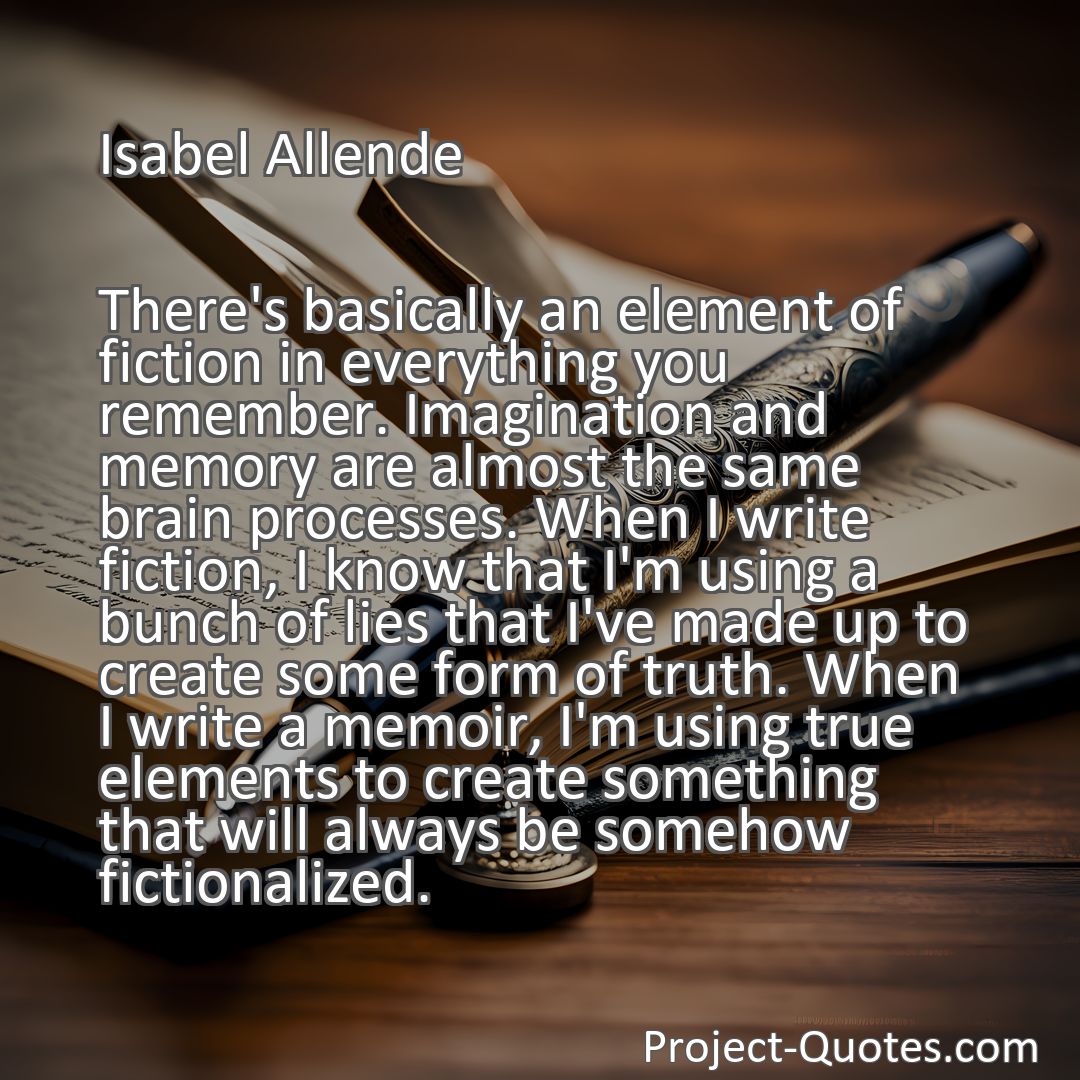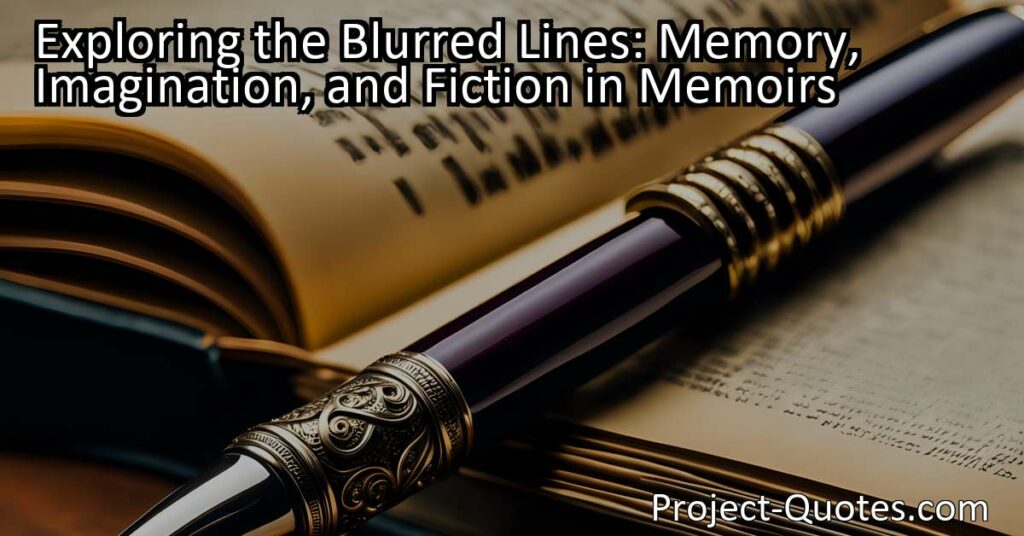There’s basically an element of fiction in everything you remember. Imagination and memory are almost the same brain processes. When I write fiction, I know that I’m using a bunch of lies that I’ve made up to create some form of truth. When I write a memoir, I’m using true elements to create something that will always be somehow fictionalized.
Isabel Allende
Exploring the Blurred Lines: Memory, Imagination, and Fiction in Memoirs Our memories can be unreliable and subjective, often containing fictional elements. Memory and imagination are closely linked, shaping our recollections and perceptions of reality. Authors use creativity to fabricate stories in fiction and rely on true elements to create somewhat fictionalized narratives in memoirs. Understanding the complexities of memory and storytelling helps us appreciate the beauty and fragility of our recollections.
Table of Contents
- 1 There’s basically an element of fiction in everything you remember. Imagination and memory are almost the same brain processes. When I write fiction, I know that I’m using a bunch of lies that I’ve made up to create some form of truth. When I write a memoir, I’m using true elements to create something that will always be somehow fictionalized.
- 2 Isabel Allende
- 3 Meaning of Quote – There’s basically an element of fiction in everything you remember. Imagination and memory are almost the same brain processes. When I write fiction, I know that I’m using a bunch of lies that I’ve made up to create some form of truth. When I write a memoir, I’m using true elements to create something that will always be somehow fictionalized.
- 4 Freely Shareable Quote Image
- 5 Related
Meaning of Quote – There’s basically an element of fiction in everything you remember. Imagination and memory are almost the same brain processes. When I write fiction, I know that I’m using a bunch of lies that I’ve made up to create some form of truth. When I write a memoir, I’m using true elements to create something that will always be somehow fictionalized.
Have you ever thought about how unreliable our memories can be? It turns out that there’s an element of fiction embedded in everything we remember. Our imagination and memory are closely linked, and they often work hand in hand to shape our recollections and perceptions of reality. In fact, when authors write fiction, they use their creative imagination to fabricate stories that somehow reflect a deeper truth. Similarly, when writing a memoir, authors rely on factual elements from their own experiences to create a narrative that may still be somewhat fictionalized. It’s fascinating to explore the blurred lines between memory, imagination, truth, and fiction.
Memory is a complex process that involves the brain’s ability to encode, store, and retrieve information. However, it’s important to note that memories are not exact replicas of past events. Instead, they undergo transformations and alterations over time, influenced by various factors such as emotions, biases, and personal perspectives. These alterations can lead to the creation of false memories or the distortion of real ones. So, even though we often believe our memories to be accurate and reliable, they are inherently subjective and malleable.
Imagination, on the other hand, refers to the ability to create mental images or concepts that are not present in our current reality. It allows us to explore possibilities, invent new ideas, and visualize things that may not actually exist. Interestingly, imagination and memory share similar cognitive processes in the brain. When we remember something, our brains actively reconstruct the past using fragments of memory and fill in the gaps with imaginative elements. This blending of memory and imagination often blurs the line between what is real and what is fictionalized.
When authors write fiction, they consciously use their imagination to construct a narrative that may not be grounded in reality. However, the best works of fiction often contain deeper truths or insights about the human condition. Through clever storytelling and the creation of fictional characters and events, authors can shed light on universal themes, emotions, and experiences. It’s as if they take a bunch of lies they’ve made up and shape them into a form of truth that resonates with readers.
On the other hand, when authors write memoirs, they draw upon their own memories and experiences to convey a personal narrative. Memoirs are meant to be a reflection of a person’s life, capturing important moments, emotions, and lessons learned. However, as previously mentioned, memories can be fallible, and authors may inadvertently add fictionalized elements to their memoirs. It’s not a deliberate act of deception but rather a result of the blending of memory and imagination. By infusing their personal stories with imagined details or reconstructed conversations, authors craft a more compelling and coherent narrative.
The use of fictionalized elements in memoirs can serve various purposes. Firstly, it allows authors to address gaps in their memories or fill in missing details. Sometimes, our memories of specific events may be hazy or fragmented, and the creative imagination helps to recreate a more cohesive narrative. Secondly, fictionalizing certain aspects of a memoir can enhance its emotional impact and engage readers on a deeper level. By adding imaginative elements, authors can evoke stronger emotions or create vivid scenes that resonate with readers’ own experiences.
However, there is an ethical responsibility for authors to differentiate between what is factually true and what is fictionalized in memoirs. Readers have a reasonable expectation that, despite some creative liberties, a memoir is primarily based on real events and honest recollections. The blurred lines between truth and fiction in memoirs have sparked controversies in the past, with authors facing backlash for misleading or embellishing their personal stories. Striking a balance between storytelling creativity and transparency becomes crucial to maintaining the integrity of the memoir genre.
In conclusion, the relationship between memory, imagination, truth, and fiction is a fascinating and intricate one. Our memories are not exact replicas of past events but rather subjective and malleable reconstructions. Imagination plays a significant role in this process, as it helps us fill in the gaps and shape our recollections. Similarly, when authors write fiction, they use their imaginative abilities to create stories that reveal deeper truths about the human experience. Memoirs, while grounded in personal experiences, still contain elements of fiction as authors reconstruct their memories. Understanding these dynamics can help us navigate the complexities of memory and storytelling, appreciating the beauty and fragility of our recollections.
I hope this quote inspired image brings you hope and peace. Share it with someone who needs it today!


